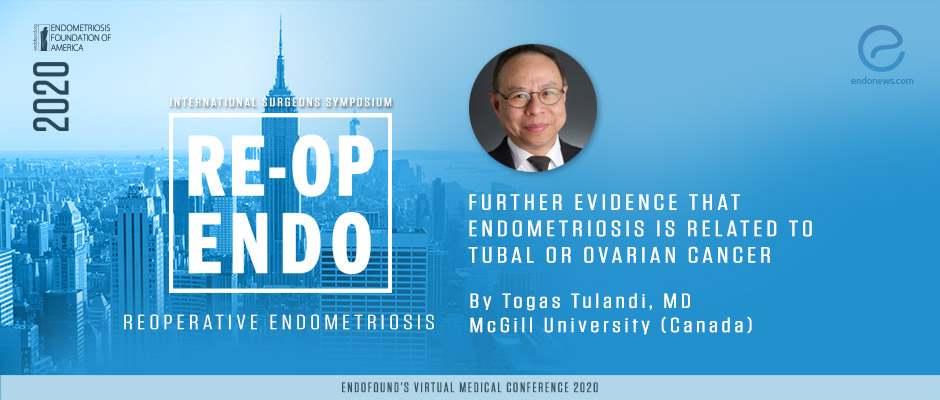Further Evidence that endometriosis is related to tubal or ovarian cancer - Togas Tulandi, MD
Dec 23, 2020
10-year Healthcare Cost and Utilization Project data analysis.
Key Points
Information for the Presentation: The speech about "Further evidence that endometriosis is related to tubal or ovarian cancer" in Endofound 2020 meeting was presented by Togas Tulandi MD. from McGill University, Montreal, Canada. He is the past president of the Council for Gynecologic Endoscopy, The Society of Reproductive Surgeons, The Canadien Fertility and Andrology Society.
Importance:
- Endometriosis and adenomyosis have both significant associations with tubal and ovarian cancers.
Highlights:
- Endometriosis is not a premalignant condition and cancer screening may not be indicated unless the patient has symptoms mimicking ovarian cancer.
Remarks:
- Dr. Tulandi and his collaborators used the Healthcare Cost and Utilization Project data, which is the largest collection of longitudinal hospital care data in the United States, and checked more than 38 million women.
- Endometriosis is associated with epithelial ovarian cancers. Comparing it to women without endometriosis, there are 3 fold more risks for clear cell ovarian cancer and 2 fold more risks for low-grade serous and endometrioid ovarian cancer.
- Despite the information above, the overall risk of transformation to cancer from endometriosis or adenomyosis is low, which means the patient should not panic. The incidence of this transformation is about 1% in premenopausal women and 1-2,4 in postmenopausal women.
- The "premalignant" feature of endometriosis is controversial. No data shows that the removal of endometriosis reduces the risks of cancer.
- Endometriosis related ovarian cancer tends to occur in younger women when compared to women without endometriosis and has better survival.
Lay Summary
Most authors suggest an association of endometriosis mainly with clear cell, low-grade serous, and endometrioid ovarian cancer. But in two large cohort studies, no correlation between them is reported (Olson et al. 2002 and Tseng et al. 2019)
Dr. Tulandi and his collaborators used the Healthcare Cost and Utilization Project data, which is the largest collection of longitudinal hospital care data in the United States, and checked nearly 77 million patients between 2005-2014 to identify the relation between endometriosis and adnexal cancers. After the exclusion of males, and females under 18 years of age, they collected data from more than 38 million women.
In this in-patient study that does not include the patients operated in outpatient clinics, they accessed 271.444 female patients with endometriosis. Within this group, almost 2000 women had endometriosis and adnexal cancer together. Other findings of this study are:
- Eight percent of these endometriotic patients have adenomyosis together in their pathologic reports.
- The prevalence of endometriosis and adenomyosis among women hospitalized in the USA over 10 years period decreased regarding this data.
- The prevalence of adnexal cancer among endometriotic patients increased while among women without endometriosis remained unchanged during this period.
- Women with endometriosis have three-fold more tubal cancers and almost two-fold more ovarian cancers when compared to women without endometriosis.
- Of interest, tubal cancer is significantly associated with different locations of endometriosis: although there is no correlation between rectovaginal endometriosis and tubal cancer, endometriosis in the peritoneum increases the tubal cancer risk.
- A strong relationship between pelvic endometriosis or adenomyosis and tubal cancer was found.
- After the presentation of the 10 years of Healthcare Cost and Utilization Project study, Dr. Tulandi underlined that endometriosis is not a premalignant disease although Australian authors claimed the contrary.
Research Source: https://www.endofound.org/further-evidence-that-endometriosis-is-related-to-tubal-or-ovarian-cancer-togas-tulandi-md?pop=mc
epithelial ovarian cancer clear cell cancer endometrioid cancer serous ovarian cancer tubal cancer adenomyosis endometriosis mc2020

